ALWAYS ‼️ EXPECT ‼️SPOILERS FILMS TELEVISION MUSIC BOOKS VIDEO GAMES ← NEW! MISCELLANEOUS FEATURED          CURRENTLY REVIEWS OP-EDS QUARANTINE ENTERTAINMENT
Don't wanna be here? Send us removal request.
Photo
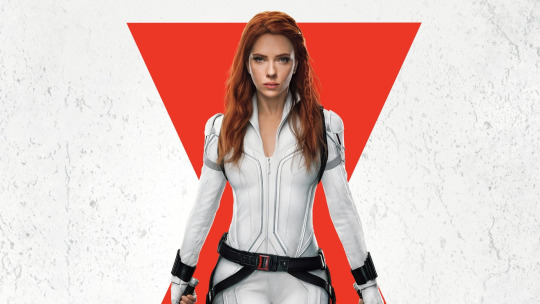
FILM | Black Widow [2021, dir. Cate Shortland]
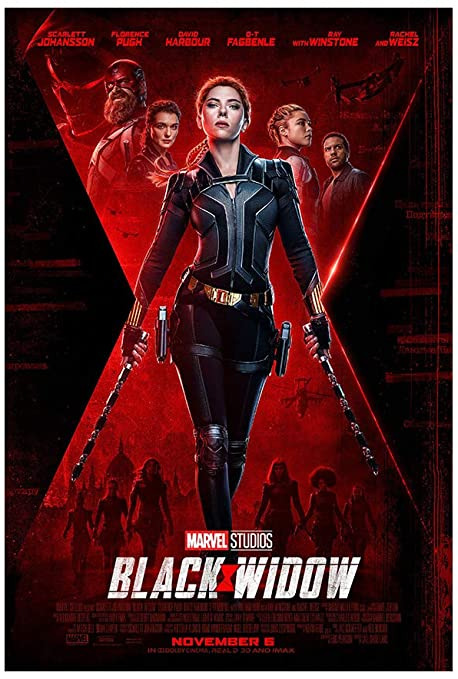
I’ve always had a bit of a soft spot for the character of Black Widow. She was the only female hero – at least in the early days of the MCU’s Avengers films – amongst a sea of men. She kicked ass without super or godly powers, she had a mysterious past before her days with S.H.I.E.L.D. There were a plethora of details that made her interesting. So the fact that it took so long for her receive her own film is blasphemous to begin with. Through the media’s hype before the film’s official release, and the claims made about Black Widow’s place in the MCU, I believe my expectations going into viewing the film were more than they should have been, and that plays a big part in why I am less than pleased with the final result.
Don’t get me wrong, I am still incredibly glad that Black Widow received her own film because you’re damn straight she deserves it, but if you’re going to declare that it will be explaining Budapest, explaining the Red Room and the creation of the Widows, explaining more of Natasha’s past (and if it was not declared as such, it’s still what we as viewers would have wanted after all this time)... Needless to say, I would have preferred an actual origins film instead of whatever this was. It’s placement as a little blip between Civil War and Infinity War, as a “What was Nat up to?” sort of thing, felt ill-placed in the MCU timeline, especially since an epilogue scene puts her amidst the period of Infinity War (as shown with her short blonde hair), and the after-credits scene jumps even further forward in time to post-Endgame. Sure, there were scenes that took place in Budapest during Black Widow, but what happened there previously and any interaction with Clint before she became part of S.H.I.E.L.D. was only briefly (and I mean VERY BRIEFLY) mentioned in a short passing scene. The Red Room and how Natasha became a Widow, still only touched on in mere moments during an opening sequence, nothing more than what we’ve seen in previous Avengers films (i.e. Age of Ultron’s flashback scenes). But her time as part of the KGB? Any interaction with the Winter Soldier? Completely absent. Black Widow, unfortunately, failed in my perspective to do anything other than bring her back together with her old “family” and then, with them, merely going through a bunch of a big budget fight/escape scenes with the bad guys. When I then also read that director Cate Shortland had no experience directing budget action films, I came to the realization that Black Widow did rely a great deal on fantastical visuals to distract from the limited story, and it didn’t even do it that well. Instead of a true glimpse into the past of a most tight-lipped Avenger, we get another bang-bang-shoot-’em-up action movie to add more red to her ledger. Every male Avenger got better story treatment, over a series of films no less, than Natasha in her one and probably only standalone tale. Long story short: sure, they gave Black Widow a film, but they still did her reaaaal dirty.
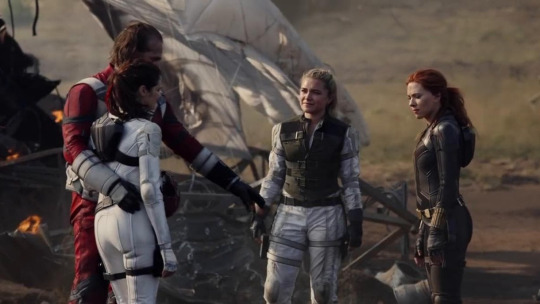
Despite its incredible shortcomings, I’m still trying hard to like it. I want to like it, and enjoy what I was given. The humor throughout the film, especially from David Harbor’s Alexei Shostakov (a.k.a. the very obvious comedic relief character), was entertaining; Rachel Weisz has not seemed to age at all and it was great to see her amongst the action as mother figure and badass scientist Melina Vostokoff. But we all know the true shining star of Black Widow other than Scarlett Johansson in her final role as Natasha... was that of Florence Pugh as “baby sister” Yelena Belova. Although I was admittedly fond of Florence before seeing Black Widow, she was quite outstanding as Yelena and her chemistry with Scarlett undeniable; I really did like her in this role. It’s really no surprise that they will be/are making way for her and her character to become a bigger part of future MCU entertainment. I’m not complaining there. AND... although I was hoping for more, I also cannot complain about any “easter eggs” or commentary from Black Widow that connect it to the other films, because that’s truthfully my favorite part of the MCU as a whole – the way that everything is so intricately connected. I can’t help but smile when they make references spanning 13+ years; their dedication to that is really what makes them successful.
Was I disappointed? Yes. I won’t lie. Almost every good scene was shown in the trailers (the film itself just providing more context), and I think there was only one twist I didn’t see coming. But so much, even the details from the film itself, were poorly explained, if explained at all. I shouldn’t have had to research or come across information when reading various items on the internet to clarify as many details that I did. I shouldn’t have had to know information from the comics (which I have not read) to fill in some of the blanks. The MCU even claimed that you would not have to watch their shows in order to understand the films, when in actuality the final end-credit scene makes a helluva lot more sense if you had. Granted, I would watch the shows regardless, I just would have liked to know that I should have watched The Falcon and the Winter Soldier and/or Loki first instead of, say, Googling who the heck Valentina Allegra de Fontaine is.
Black Widow, on IMDb alone – I don’t dare venture further out into the Internet for this one – is flooded with poor reviews, and it really does pain me the amount of truth contained in the few I skimmed. Florence Pugh carried the film; Natasha was a sidekick in her own movie; Taskmaster (who I don’t know enough to say anything about here) was ruined... but the thing that bothers me most, as one reviewer stated perfectly, is that this is “the first MCU film I’ve hated, and I’m shook.”
I wouldn’t go all the way to “hate” per se, as I'll always love Marvel and the cinematic universe it has built, but... Me too, buddy. Me too.
#black widow#natasha romanoff#natalia alianovna romanova#yelena belova#alexei shostakov#red guardian#melina vostokoff#scarlett johansson#florence pugh#rachel weisz#david hardbour#marvel#marvel cinematic universe#MCU
12 notes
·
View notes
Text
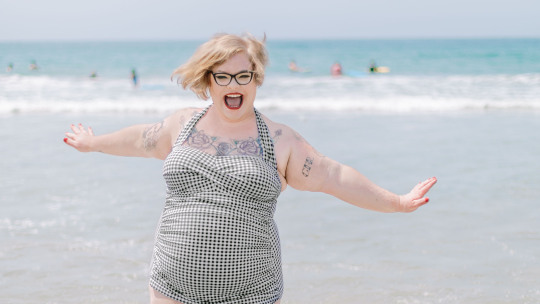
BOOK | Landwhale: On Turning Insults Into Nicknames, Why Body Image is Hard, and How Diets Can Kiss My Ass by Jes Baker
This is the first book I picked up and actually finished in over a year.
I just need to sit with that statement for a moment.
🤔
The reality of this still baffles me. That I could not partake in something I thoroughly enjoy (reading a book) for over a year. At the start of the pandemic (early 2020), something in me just... broke, and I couldn’t do anything anymore – which is the sad reality of why I’ve hardly had any new content on The Rachel Perspective in a long time. But alas, something about Landwhale spoke to me. Jes Baker spoke to me.

One of my first book reviews on here was Jes Baker’s Things No One Will Tell Fat Girls back in 2016. It was also, I believe, my first body positivity piece of literature I ever read AND my post to date with the most likes/reblogs to its name. It was many things, but the important fact was that I loved it. It was a great book that solidified aspects of my own personal journey with my self-image, beyond what I had already achieved on my own. But what Things No one Will Tell Fat Girls did from a self-help and statistical aspect (it was, after all, subtitled as a “guide”), Landwhale instead approaches from the more cold-hearted truths of being a fat girl. Where her debut novel was chalk full of lists and ways to help yourself love your body, the sophomore novel delves into the reality that existing in this world – for everyone – is actually really f*cking hard.
At the beginning of Landwhale, Jes includes a trigger warning. For the whole book. While I fortunately did not really feel any triggered responses from the topics she discussed take heed of the trigger warning, I fully understand how a lot of the material could be unnerving. This time around, it wasn’t just another “I’m a fat girl, hear me roar” set of essays about the struggles every fat girl has come to experience time and time again. You know, those usual struggles with clothing/fashion, bullies, etc. Here, instead – and seriously, I applaud Jes so so much for this – she covers the mental health side of the struggles more in depth, like the self-deprecation, the problems that arise within the fat community itself, the doubts and fears when in a relationship (especially when your significant other is smaller in stature). Things No One Will Tell Fat Girls skimmed the surface of the basic troubles of a plus-size individual and her approaches to combating those issues; Landwhale, however, dove more deeply into that tough material. But honestly, I’m so glad she did this. It all needs discussing because, truthfully, so many people struggle with these things – myself included. And because has a background in mental health work, having been employed as a psychosocial rehabilitation specialist and is a credentialed peer support specialist and educator (in the state of Arizona)... well, needless to say, I trust what she says. Jes has proved time and time again that she not only lives the plus-size life and can speak from years of experience, she also is invested in helping others enough that she does this kind of work for a living. And maybe because I did feel like I related so much to Jes throughout Landwhale, it could be that I have some unrealized traumas that I never truly understood until now. Maybe the things people say around me (or to me) in relation to their bodies, to this day, still have a negative effect on my psyche despite any self-proclaimed positive, good-standing view towards my own body. Learning moment, y’all.

Although geared toward and obviously best suited for the fat community, Landwhale is still a great discussion for all of us living in our own bodies, just as it was with her first novel. Our bodies are ours and ours alone; we live for no one but ourselves. It is no one else’s place to discuss our bodies, nor dictate what the standards of beauty or health based upon them. Although, yes, many of the narratives are fat specific – not being able to partake in amusement park rides due to size constraints, equally the struggles of airplane travel, or medical professionals only trying to “cure” your obesity rather than the ailment you actually met with them for – there are still anecdotes that everyone could benefit from. Important conversations about capitalism, diet culture, fatphobia, even questions about what is considered “acceptable body alterations” in relation to body positivity.
What we must remember is this: “Let people own their own journey while remaining steadfast in yours.” We are all, after all, human.
#book#books#read#reading#literature#landwhale#landwhale by jes baker#jes baker#fat community#plus size#plus size community#body positivity#body positivity movement
3 notes
·
View notes
Text

VIDEO GAME | Assassin’s Creed IV: Black Flag [Nintendo Switch]
Other things to call this post –
• “Things Rachel finds eons after it actually comes out” (in regards to the Assassin's Creed series)
• “Things Rachel starts in the middle of the series instead of the beginning,” and/or...
• “Things inspired by something else that made me abandon that other thing entirely.”
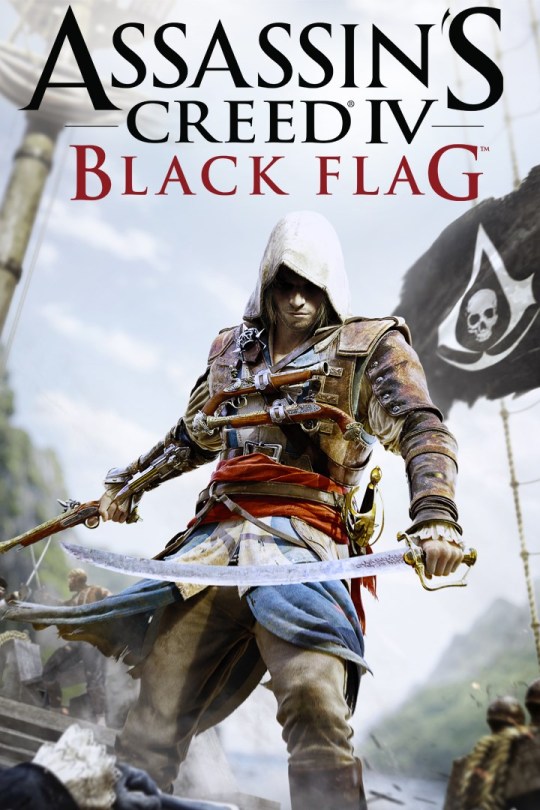
Earlier this year, I started playing Immortals: Fenyx Rising and quite enjoyed it. Enough to hastily head over to the internet to search for similar styled games to add to my wishlist. Assassin’s Creed was included on multiple lists especially with the recent release of its newest iteration, Valhalla. But reading more about the series as a whole, I quickly became intrigued by its many versions. Shortly thereafter, thanks to one of my local GameStop stores closing (and my deep love for discounts), I happened upon a copy of the “Rebel Collection” – which includes Black Flag and Rogue, plus their respective DLC – for a decent price and quickly snatched it up. Little did I know the obsession that was about to begin. Fenyx Rising who?
After 120 hours of game play as I completed the main story and the side quests (I’m a very annoying completionist), I have discovered that I find great satisfaction in sneaking up on and shanking people. Knowing full well I wanted to play more of this game while enjoying the different locales and periods of history, I actively sought out and purchased all of the Assassin’s Creed games/applicable collections for the PlayStation and Nintendo Switch.
TL;DR– this was my first Assassin’s Creed game, but I loved it so much that I obsessively played it for weeks, and now want to play all of them.
It’s a widely known fact I come to find and enjoy things looooongggg after everyone else has had their way with them, so there’s really no surprise here. But I don’t mind because I absolutely hate waiting for new releases of anything anyways (games, books, movies, etc). With that in mind, there is a LOT of discussion out there that Black Flag is not a fan favorite of the series. I enjoy pirates, so I ain’t mad about it as a starting point into the series. Plus, what’s not to enjoy about the sexy blonde-haired, blue-eyed, tattooed pirate Edward Kenway?
What I think really ruined it for gamers was the strange plot twist that revealed itself towards the end of gameplay. Or at least “plot twist” is what I’m going to call it and the reason I’m giving for not 100 percent loving the story. Remember how Indiana Jones was a pretty great series until they added the fourth movie and it felt totally disconnected from the rest because they added aliens? That’s what Black Flag reminds me of – it’s all great and piratey… until you find out what the Templars sought in this particular game and what it can do. The Observatory building design and the device it held felt so jarringly alien that I dare say I felt that same disappointment as I did from Indiana and his crystal skulls. In both, I’m not sure what inspired creators to include an unconnected sci-fi element in an otherwise interesting story. However, I will wait until I have played all (or at least more) of the Assassin’s Creed series before I rank it so low as other game players do.
WHAT I LIKED
✔︎ It tells you exactly what to do! I learned that I really enjoy games like this, with literal steps to achieve the end goal. Like the issue with playing Animal Crossing, for example, is that you have to literally create things for yourself to do, unless there is some sort of event taking place or you’re still trying to complete your museum. But games like Assassin’s Creed or Immortals Fenyx Rising (and so many others I haven’t discovered yet) that have you play through a story and give you objectives and quests to do, that style really works for me. Currently very glad that I have the rest of the series to keep me busy for a while. ✔︎ Assassinations I’m realizing I might like violence a little too much because sniper shots and stealth attacks brought me far too much joy while playing this game.
✔︎ Petting the Animals I know it’s a small feature, but the non-hunting animals in the game – cats, dogs, and even a cow – are pettable. AND, even though I completed it without realizing it was a thing, petting a certain number of animals is an “Abstergo Challenge” objective.
WHAT I DISLIKED
✗ Maneuvering Edward. Don’t get me wrong, I did eventually get the hang of it, but even then there were times where I missed achieving something because he managed to get stuck in a spot (usually hanging from a rooftop) and wouldn’t move despite my using proper technique (aka moving the joy stick around like a crazy person). EDIT: I later learned this has a name – the “Assassin’s Creed Curse.” ✗ I was unable to achieve an objective the same way other players could because of my console (Nintendo Switch vs. Playstation). One of the “to dos” in the game was crafting the Whale Hunter outfit by using the skins of the white whale. Well, as a Switch player, I was not able to access the Community Events that would spawn the white whale, as was available for the Playstation. Instead, I was only able to achieve this by merely purchasing the whale skins – very anticlimactic – and crafting the outfit that way. While glad I was still able to complete the task, I was also kind of bummed about not being able to hunt the whale itself. Just for a moment, I wanted to feel like Captain Ahab lol. ✗ Motion controls, or lack thereof. Either I neglected to turn them on, or they weren’t available for the Switch, but using motion controls for certain tasks would have helped GREATLY. Especially trying to shoot something. It would have saved a lot of time and effort instead of twitching the joycon back and forth trying to aim my gun or my harpoon. Remind me to look into that when I play Freedom Cry (AC4’s DLC featuring Adewale, Edward’s quartermaster on the Jackdaw) or when I start Rogue.
#games#game#video game#assassin's creed#assassin's creed 4#assassin's creed IV#assassin's creed 4: black flag#assassin's creed IV: black flag#black flag#edward kenway#nintendo switch#playstation
1 note
·
View note
Photo

FILM | Little Women (2019, dir. Greta Gerwig) I remember fondly my years as a kid when I used to read the Great Illustrated Classics version of Little Women. I can’t recall exactly how I felt about the story while reading that abridged version, but I do remember picking it up repeatedly. Maybe it’s because it has been a revered classic for decades and my young mind was just trying to enjoy it at that same level. Regardless, having finally viewed a Little Women film – this one by Greta Gerwig – for the first time, my interest in the tale has been renewed. Maybe it’s high time for me to read the novel again. The true, full version as it was intended. (I have a project in mind for this; details to come).

This film, while I have nothing to compare it to, felt incredibly well done; a product of its time. Where the other renditions seemed stuck in their respective years when made, old and aged from years passed, this version seems much more... timeless. The actors involved, especially that of the four sisters, seemed far too perfect for their roles. (Although I still struggle to see Emma Watson as anyone other than Hermione Granger). Combined, these four ladies portrayed sisterhood in such a believable way, more than I think I’ve ever seen in some time. The mannerisms acted so naturally between them, the embodiment of each sister captured so perfectly by Emma, Saoirse Ronan, Florence Pugh, and Eliza Scanlen. Even the supporting actors were quite expertly chosen in Timothée Chalamet, Laura Dern, as well as Meryl Streep starring as Aunt March in the limited screen time she had (but really, who dares speak ill of Meryl Streep? Not me).
What I think I missed most when I read the novel (possibly because the book didn’t include it at all or because I was too young to register any symbolism) was the air of feminism and the power of women found in a handful of scenes within Gerwig’s Little Women. The most foremost in my mind is, of course, the speech given by Amy to Theodore “Laurie” Laurence about a woman’s economic standing, how women of that time period were quite powerless and their pursuits for marriage were really all they had to bargain with. As Amy reminds audiences, women really had no way to earn money at the time, not enough to make a living and definitely not to support a family. And when a woman of that time period married, her money, belongings, and even the children produced immediately became the property of her husband. While not nearly as drastic as the years surrounding the Civil War, I dare say that today’s times have not done much to change this disparity. That is to say, some of what Little Women touched on in material is still entirely relevant. Women still seem to earn less than men professionally; some men, despite the progression in a metaphorical handful of them, still believe they own and can demand women for their bidding. I know that is a generalization and not meant to disregard the good apples that can be found in the orchard of the male sex, but these ideals can be seen as recent as the 1950s, if not later, which is a whole 100 years after Little Women takes place (set in the 1860s). I can say, from personal experience, that not much has changed since these times. Marriage may not be as extremely pursued as it was back then, but women of the 21st century still bear the ever-constant question of “So when are you getting married?” (and even “When are you having kids?”) as though it is still the only significant thing we have or should ever strive for. As with each March sister to which this topic is relevant, today it is also merely a matter of how we’d pursue it. By way of Meg, in becoming a debutante, or by way of Jo, in avoiding it with vigor.

And really, to discuss Little Women without mention of Jo would just be wrong. Her character is written (at least for this film) quite magnificently, but I believe the energy brought forth by Saoirse Ronan really made this rendition shine even more. While I again would need to reread the source material in order to truly make comments about it, the way her loneliness was approached, despite her fierce independence, was something that hit me deeply as I watched. Because it was something I personally have also experienced this before in my life. I dare(d) to reject certain societal norms, yet still always felt the yearning for deep companionship and love as strongly as Jo did.
With such exquisite acting and storytelling, Greta Gerwig’s Little Women was also wonderfully filmed. Aesthetically beautiful, the littlest things that provide such fantastic details to the overall story (i.e. Jo and Laurie wearing each other’s clothing to show just how close their relationship was); it reminds me of the same joy I feel when watching the 2005 version (aka the pretty version, let’s be real) of Pride and Prejudice. As such, I would very much like to partake in viewing more of Greta Gerwig’s work after seeing this film.
#film#films#movie#movies#little women#little women 2019#greta gerwig#emma watson#florence pugh#saoirse ronan#timothee chalamet#laura dern#meryl streep#the march sister#jo march#amy march#beth march#meg march#marmee#laurie laurence
24 notes
·
View notes
Photo

BOOK | Scrappy Little Nobody by Anna Kendrick About the author: Anna Kendrick is shorter in person.
No really! That is the last printed page of this book; she wrote it herself! The shortest (haha pun intended!) author bio I think I’ve ever seen... but honestly, such a true testament to she who is Anna Kendrick. She may no longer be a “little nobody” in the world, but the scrappy part is still vehemently true, as proved through the plethora of personal stories shared in this, her debut novel. And I enjoyed every minute of it.
I’ll admit, I used this book the same way I’ve used many books I’ve read lately – as a way to decide if I like a celebrity or not. Like, for some reason, I seem to think I need proof that celebrities are likeable and human just like me, and then proceed to put a lot of pressure on their ability to write a book about themselves. HEAVEN FORBID they say something I don’t like.
*throws book down and walks away*
. . . *sighs*
*trudges back, picks it up and continues reading*
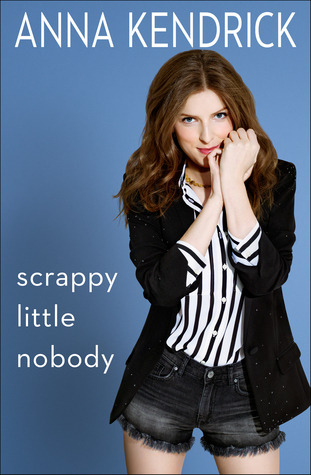
As a Twi-hard in my younger days, I knew of Anna Kendrick from the Twilight film adaptations (ok shush, it’s still a guilty pleasure despite all its numerous faults). Then, she was the cool rebellious-ish girl I always wanted to be as Beca in Pitch Perfect; she was actually great as Scott’s sister Stacey in Scott Pilgrim vs. the World; and it became fact that she reaalllly had pipes when she starred as Cinderella in the musical film adaptation of Into the Woods. And if that weren’t enough, on occasion we could all be reminded how entertaining she was/is/could be when she takes to the Twittersphere. She even wanted to call this book “A Tweet but Longer”. But, like many who came before her, I didn’t have any solidified opinions of her or her work; she was just another celebrity, and a seemingly quirky one at that. Yet I remained indifferent as always (I’m so annoyingly forlorn that way). Well, consider me swayed, y’all – I fricken love her. Let me say it a little louder for the people in the back just in case you missed it. I LOVE ANNA KENDRICK.
Sorry - sorry, I'll calm down.
Initially, what I thought were atypical jests from Anna that she would just post on social media, turned out to be the way her mind actually thinks and works on the regular. Or, ya know, she’s really good at faking it for roughly 270 pages and countless tweets. The entirety of Scrappy Little Nobody was full of amazingly witty quips that I absolutely relished in. Especially the wisecracks in which she was able to incorporate pop culture (I really do love when other people utilize pop culture references into every day banter; it brings me joy). Even better, I was actually able to learn more about her PERIOD, from the woman herself! Which is absolutely my preferred method of enlightenment. Because it turns out, I really didn’t know anything about her. Long story short, reading Scrappy Little Nobody was a revelation in more ways than one, and now I legitimately just want to binge all the work she’s ever done in film (and I suppose in series as well, as she recently starred in a HBO Max original show too).
I’m slightly fan-girling here, and it reminds me of the time I was blind to how great Amy Poehler was before reading her book. Oh, the rocks I’ve been living under. I’m slightly embarrassed.

There’s something to be said about actors that begin their careers in theater. Like, they give off a different sort of vibe that I’m not sure how to properly articulate. Anna is one of those actors, having gotten her start in le theatre when her age was still in the single digits. Commuting from Portland, Maine, to New York City for auditions may sound absolutely horrible – that’s a five-plus hours commute she would often make alone with her 14-year-old older brother – and then living away from home for months at a time during the run of said shows, SUCH KUDOS for that dedication. To add to the wonder of Anna’s diligence to her craft, this did gain her the “second youngest person” Tony Award nomination for her role in High Society. She was outdoing us long before any of us knew who she was.
Through tales of her childhood, young and not-so-young love, and what it’s like to be a part of films and the Hollywood scene at various ages, we learn that in a more realistic sense, Anna is actually more stocked with us commoners than her celebrity counterparts. During some of her retellings of award shows, events, and similar ventures that comes with her cinematic stardom, I felt as though she was just “one of us” that was allowed to take part in these things, so she could then regale to us an inside scoop of the realities of Hollywood. She is there because of her talent, of course, we all know; but she’s just as nervous around other celebrities as we middle-class fanatics would be. I know that even the most well-known, highest salaried celebrities are still just as human as I am, but sometimes it’s people who really show their vulnerability like Anna Kendrick that are naturally more easy to relate to. Like she tries her hardest to illustrate the warmth and tenderness shared during her time working with George Clooney, but you can’t help but still feel that that man is some form of superhuman regardless, even to her. The “OH MY GOD IT’S GEORGE CLOONEY” is still there. To quote the woman herself, “I am - at best - a normal human being, and this [her fame] has all been a big misunderstanding.”
However, amidst all the feelings of incompetency she constantly repeats throughout Scrappy Little Nobody (similar in the way that Amy Schumer constantly demeaned her own looks in Girl with the Lower Back Tattoo), I still enjoyed Anna’s book. I adored her style of humor, as it really does align with my own. And while her personality is inherently quippy, she shows a deeper, more poignant side of herself through some crucial topics she chooses to discuss within these pages. She may crack jokes, as we all might, to help lighten the tough stuff, but she still provides strong opinions – even if it’s just a sentence – about things that are important to her, sprinkled throughout pages about life in Maine, the theater, and Hollywood.
How do I most like Anna Kendrick though? She too is a 10-hour sleeper. I have finally found my people!
#book#books#read#reading#literature#scrappy little nobody#anna kendrick#pitch perfect#into the woods#twilight#scott pilgrim#scott pilgrim vs. the world
3 notes
·
View notes
Photo
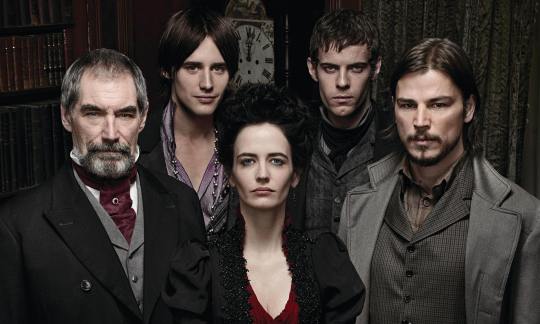
TV | Penny Dreadful (2014-2016)
This review has sat in my drafts for over a year. (It’s been a weird year, don’t judge me). Although I had a few notes sufficient enough to write a review from and could have probably have finished and posted something by now, I will honestly say that I have pondered Penny Dreadful this entire period of time. Even as I watch other series and take part in other media, every so often my mind wanders back to Penny Dreadful. Whether the show intrigued me or irked me has not entirely been decided, to the point where I am almost feel hastened to watch the show again with more attentiveness. But, just as I feel about Marvel’s Iron Fist series, I’m not sure I want to endure some of the more vexing qualities of Penny Dreadful a second time around (though I sadly will for Iron Fist as I once again attempt to complete the entire Defenders collection).
Let’s see what I can make of my long-stored memories.
Penny Dreadful derives its name from what is essentially Victorian England’s version of a comic book, typically with narratives of crime or violence. As per Britannica, these eight-page installments – also called “dime novels” or “bloods” – were carelessly written second-rate works full of gory themes. While I wouldn’t say the series to be careless or second-rate, it definitely hits the crime, violence, and horror right on the nose to give its namesake proper honor.
Set in the late 1800s, Penny Dreadful bears resemblance to The League of Extraordinary Gentlemen in that it includes characters from various works of classic literature, though Penny Dreadful sticks to the obvious era of Victorian Gothic. Although its main characters Sir Malcolm Murray (Timothy Dalton), Vanessa Ives (Eva Green), and Ethan Chandler (Josh Hartnett) were created for the show, its supporting cast are directly named after major literary characters – Dorian Gray (Reeve Carney), Dr. Victor Frankenstein (Harry Treadaway) and his Creature (Rory Kinnear), as well as brief appearances throughout by Mina Harker, Abraham Van Helsing, Dr. Henry Jekyll (sadly, while the science is included, Jekyll’s own counterpart Hyde was not), Dracula, and Justine (from The Misfortunes of Virtue). It has been discussed online that the character of Malcolm is based on famed adventurer Allan Quartermain from King Solomon’s Mines and, by name, obviously a derivative of Mina Murray’s father from Dracula; however, he was not mentioned in the novel. Similarly, Vanessa Ives is said to be based on Mina’s best friend Lucy Westenra. Furthermore, the story arc of Brona, who then becomes “Lily Frankenstein,” shares obvious similarities to that of the Bride of Frankenstein.
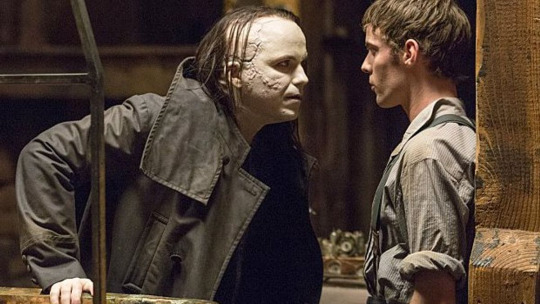
The rich inspiration from classic literature is what initially drew me to watch Penny Dreadful, along with the hype I read when it was initially released in 2014. Despite the fact that I am typically not one for horror-based film or television, I undertook the task regardless. Per my usual reasoning (I swear I write this in everything and I apologize lol), I wanted to discover for myself if it was truly as great as the critics say. And dare I say, it was actually true for the first season. I remember posting something on Instagram stating how I understood the public interest in the show and that I was excited to continue on. While it has no doubt been some time since I’ve viewed the material, I distinctly remember my personal fascination dwindle shortly thereafter. Had I any sort of ability to abandon the media I try to consume, it might have caused me to not finish the show. But alas, I’m one of those hopefuls that thinks maybe it will get better. Plus, can you really say you watched something if you didn’t watch the entire thing? My answer: no. Must watch it all to have a proper opinion!
Wherein the first season focuses primarily on finding a kidnapped Mina Murray, with tolerable amounts of arc for Frankenstein, his creature, the mysterious Ethan Chandler, and Dorian Gray... the latter seasons revolving around witches and “nightcomers” (season two), and Dracula (season three) – as well as the constant battles between Frankenstein’s scientist vs. his creations, the dragged out uncovering of Ethan’s background, and Dorian’s inability to keep it in his pants – just didn’t seem to have the same charm to me as the initial season. Maybe it was the story? Were these the best “big bads” writers could come up with? I suppose, yes, considering the source material of that particular period, there’s only so much to work with. But to have the first season’s enemy be simply a vampire and the third season’s Dracula, it seems to me like missed opportunity (like using Dracula in his actual storyline) or they were really just recycling material. You used vampires once already; was doing it again with one buffer season in between really your only option?
Other nagging details that truthfully somewhat prevent me from watching the series again include things like: how much of Vanessa’s “dialogue” actually includes Eva Green’s ability to make guttural sounds; how certain arcs overwhelmed the series (like Frankenstein’s Creature and Lily, though kudos to Penny Dreadful for exploring their thoughts/feelings that other films or shows have not), compared to others tales that were not fleshed out enough; characters from literature left me wanting more, even if I did already know their mythos (Dorian, for example, was merely only a brief glimpse at his portrait, no explanation of its mysticism); and lastly, Lily’s entire story felt too much for me. While I admire the show’s portrayal of feminism, body autonomy, and a sense of sisterhood amongst Lily and her “army,” her approach to these topics also felt preachy and eventually fell more into a “savior” complex. I can understand the rediscovery of life as a newly reanimated human, re-comprehending life and death, not allowing any man to “own” her purely based on his say-so... but the way the show writers approached it was not my favorite. Billie Piper was great in her role, but towards the end of her arc, I was bored with Lily’s endeavors.
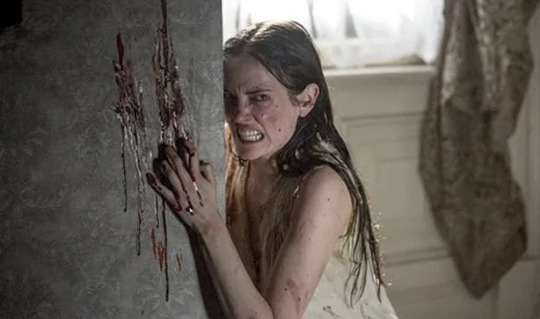
My biggest pet peeve surrounding this show, however, was actual a very random detail – Ethan and Brona (Lily, in her previous life) had a very intense relationship during the first season before she succumbs to illness. How is it, despite both of their prominence in the show and their respective arcs, as well as mutual acquaintances with other characters, that Ethan never ever crossed paths with Lily at all once she was reborn? Was it because he would obviously recognize her as Brona and writers didn’t know how to incorporate that detail into the show? Was it because they wanted Lily to remain purely a character in Frankenstein’s and Dorian’s arcs? Someone please answer this for me, because it drives me nuts.
All in all, Penny Dreadful started strong and I did enjoy it at first, but its subsequent seasons and finale felt less than spectacular. What was once an enjoyable suspenseful thriller turned into a psychological drama looking to interpret everyone’s personal issues and traumas rather than working together for a common, supernatural cause. Where the first season saw everyone as a collective group, I feel the show slowly but surely lost its charm by increasing their solo arcs without much interaction amongst everyone as a whole. It’s not to say that they never spoke to one another (Ethan and Lily being the exception), but their interactivity became increasingly minimal. I will give writers some credit in that, for some characters, this solitude reflected their emotions and was necessary for their arc. But maybe I just believe the show was better when the ensemble was a more cohesive whole.
#tv#television#tv show#television show#penny dreadful#eva green#josh hartnett#vanessa ives#ethan chandler#dracula#dorian gray#frankenstein#bride of frankenstein
5 notes
·
View notes
Photo

BOOK | Unqualified by Anna Faris
Remind me to pay more attention.
When I was about to begin this book, I was blindsided by the subtitle that I have never seen and only found on the official title page once I opened it. This is not just Unqualified by Anna "Rhymes with Donna” Faris; this is Unqualified: Love and Relationship Advice from a Celebrity Who Just Wants to Help. Excuse me WHAT?! Turns out, I’ve been under a rock and this is the gist of both her podcast and her book. And here I thought I knew things. *facepalm*
While she may not necessarily be qualified in the love department, she is actually qualified to write a book. Or at least a little more qualified than some other celebrities. Our lovely Anna actually has a degree in English from the University of Washington, and that honestly gave me so much hope going into Unqualified. One thing I always struggle with is when celebrities are given book deals seeming to only sprout from their fame; most are horrible writers, but I suppose that’s what gives those books their charm, proving even in the slightest that yes, celebrities are just as flawed as we are, except with more money. ANYWHO, finding out that Anna knows her stuff was such a promising fact. ‘Cause let me tell you, if I based reading a book on it’s Foreword, I would have put this one down and walked far away. (That’s not entirely true, but you know what I mean).

Let’s start by talking about the Foreword by her then-husband Chris Pratt.
First and foremost, I want to say that, knowing that Anna and Chris announced/got divorced shortly after the publishing of this book in 2017 kind of puts a damper on the whole thing. Not because it may insinuate to some readers that she should not be giving advice on love and relationships, but rather because they were such a cute couple and, as many fans said once it was announced, makes it feel like love is dead if these two couldn’t make it. So the dedication, the foreword, and the plethora of times she discussed her relationship with Chris throughout the book were all so sad. And the way she talks about him and the anecdotes of what he’s done for her... it really is so difficult to believe that these two didn’t last.
Secondly, Chris Pratt should not be writing. This foreword was so painfully awkward that, like I said, if I were basing my continuation of a book on that first introduction, I would not have read it. And if you Google the topic, you will find numerous online articles with this same connotation; we all agree it is baaaad. Not only did he spend more time talking about himself and how he doesn’t know what a “foreword” is, he also made it sound like it was just an obligation with a word count. “I love her and respect her and told her I would” was his reasoning. Not once did I feel like he set the mood for the book from a more personal perspective, as a person who was her family for a decade, but rather he was giving us a short biography of Anna – things like how they both grew up in Washington, how they’re both actors that play idiots (his Andy Dwyer to her Cindy Campbell), how acting is her passion, various traits of her personality (how she is kind and what he calls an “information collector”). There was one line that made me believe that he was writing this foreword as a way to convince us to give Anna a book deal as if we were the publishers. He says “Anna deserves this book. I can promise you it will be a great and interesting read.” Yes, Chris, it was. But your foreword could have provided so much more than a grade-school style report on your ex-wife. I’m so glad Anna also wrote her own introduction. If you do end up reading this book, please just skip right to her intro.
In the first handful of chapters of Unqualified, I wasn’t entirely convinced that this book was worth reading. Especially during those times where she straight up admitted that she was giving advice based on speculation instead of actual experience. I’m not saying that Anna has to have experienced everything experience-able in order to talk to people about it, but saying that she didn’t actually have a relationship related to a certain topic just puts a damper on what she’s trying to help with. Like the list of men she says to not date; it includes musicians, doctors, athletes, chefs, therapists, and actors. (It also includes magicians, but I think most women steer clear of them anyways lol). With the exception of actors, none of those are based on her own personal experiences with anyone in those professions. She even says to us “I have zero experience.” So who should you date, as per Anna Faris? Woodworkers. Or a guy who makes boats, because they brood. *shakes head* Girl, I can’t even.
While I’m indifferent to the portions of Unqualified regarding her childhood through most of her young adult life (college shenanigans don’t really pique my interest), there is a passage that has stuck with me long after finishing this book. Anna’s childhood crush/ “boyfriend” (she was 8 years old here, call it what you will) had just dumped her. So she goes home, grabs an orange from the fridge, writes this horrible boy’s name on it in marker, and then proceeds to chuck said orange into the forest behind her family’s home as a means to get over him. Anna dubs this the “orange ceremony,” which she says she must have felt it symbolic, wherein casting fruit into the “abyss” would rid her of the emotions of the situation. She may have been a child at the time, but as an adult, I absolutely love this concept. This sort of symbology is very reminiscent of various practices in paganism. Obviously not her intent as I highly doubt she was a practicing pagan at eight-years-old, but the truth is, things like this can actually work. Some of us older individuals would just need a lot of oranges.
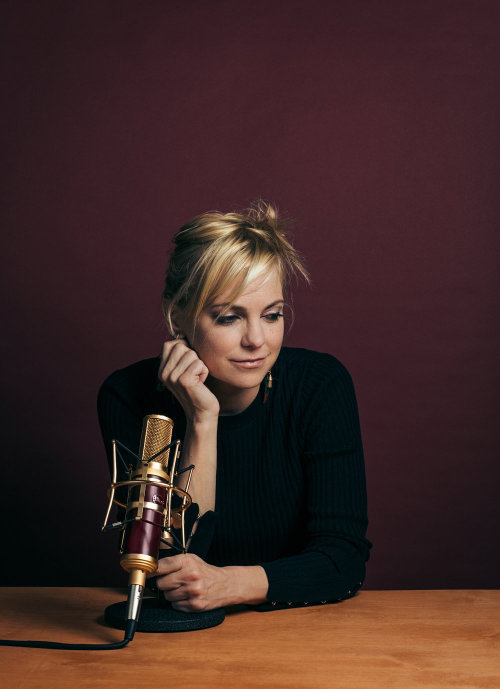
The reason it has taken me soooo much longer to write a review for Unqualified (I finished it months ago, yikes!), is because I honestly just don’t know how I feel about it. My notebook is filled with pull-quotes and excerpts that stirred me in some way, shape, or form – and many of them, very good! – but as an overall novel, I can’t decide if I should keep it for a future reread, or donate it. The only thing I feel that really sticks out in my mind about this book was how much I hated Chris Pratt’s introduction. And that is sad and depressing.
I did like that Unqualified was not just purely about love and relationships advice, and that it was intermixed with her personal memoir. I say that because there were plenty of times where her advice was not even advice at all. Like, for example, when she moved to Los Angeles with/for her then boyfriend. It’s reminiscent of an action many women take in tales of love. However, Anna also followed a career venture. This wasn’t solely about following her boyfriend out of sheer infatuation; if the relationship didn’t work out, she still had something there to fall back on, and that’s not something typical of an experience like this. Granted, yes, it’s kudos on her part for going for her own reasons, as well as for a guy, and it plays into her discussion of feminism at the beginning of the chapter. But in this of many parts of the book that was supposedly advice-driven, I made the note that maybe one sentence or one small paragraph at the end could have passed for guidance. At least, in most cases, she’s aware it’s not helpful.
Despite my typical qualms with books like Unqualified, at least for the time being I think it will remain on my shelves with my other keepers. Although her counsel is indeed questionable at times, it’s hard to deny how much I relate to Anna Faris and agreed with a good handful of the statements she makes in the book. And instead of doing all the talking herself, portions of Unqualified found basis from her podcast listeners through "Listener Responses,” as well as discussions and interviews with some people in her life (like Sim Sarna, her podcast partner in crime, and then husband Chris Pratt), and I like that aspect about it. It’s not just Anna retelling information from her perspective; it’s letting those people she has learned from have a voice as well.
I jotted a final note that I think sums up my thoughts on this book pretty well: Unqualified probably could have just remained a podcast. But for those of us not necessarily interested in listening to hours upon hours of content, the book is a good alternative, especially since Anna mentions in the beginning that the book is based on what she learned through two years of the podcast. A lot of Unqualified contained thoughts and experiences I personally could relate to and has happened to me, so, to quote myself “I suppose her book did what she wanted it to do.”
#book#books#read#reading#literature#anna faris#unqualified#unqualified by anna faris#review#reviews#quarantine#quarantine reading#quarantine reads#I finished this book in like... june *facepalm*
1 note
·
View note
Text
Opinion: LGBTQ media feels crowded
Over the past few weeks, I’ve been trying to find films and/or shows to watch in honor of Pride Month (and yes I know, I’m running out of time here for me to actually watch them during the month of June). But as I was searching through my plethora of streaming services for LGBTQ related stuff to watch, I noticed something.
Each search I made, on each service, returned a lot of results.
I admire writers and producers being progressive in today’s day and age of cinema and television, but it took a good amount of weeding through these results to find films/shows where the queer individual is actually the main protagonist, or queerness is a more central theme rather than a side story. It feels as though these days, every show has a gay character – which there is nothing wrong with at all and that’s what I applaud – but it makes finding the truly queer broadcasting all that much harder. And dare I say it, I feel like LGBTQ media has become very congested. Because when I search for LGBTQ, I see films and shows I already recognize, and I already am aware that within those films/shows, only a mere fraction of time is related to being queer. I know shows about families (like One Day at a Time, Modern Family) or ensemble casts (like The Bold Type, Buffy the Vampire Slayer) can’t be all queer all the time, but if the majority of said show focuses more on the hetero characters, I personally would not consider it to be a LGBTQ piece of media. And that’s a lot of what I saw in my searches. I’m not saying those stories are unimportant, because honestly, some provide great visibility into the lives of queer characters and heteros together. But I almost want it to be its own separate search tag, like “LGBTQ-adjacent,” or “LGBTQ on the side.”
When I search for LGBTQ, I’m thinking shows like Queer as Folk, The L Word/Generation Q, or Looking. I’m thinking movies like The Birdcage, But I’m a Cheerleader, The Danish Girl, and DEBS (yes, guys, I love the movie DEBS).
Even though it took a bit more research into the storylines of various titles, I think I have finally concocted a decent list of about 20 films, shows, and documentaries to watch heading into the month of July. I swear one of these times, I’ll get the timing right and start this at the BEGINNING of the month. Then again... maybe Pride shouldn’t be sequestered to just one month. 🤷🏻♀️
2 notes
·
View notes
Photo

TV | SyFy Wire’s The Great Debate
Episode viewed: S1E1 “The Great Deb-eighties” (premiered June 18th, 2020) featuring panelists Orlando Jones, Amber Nash, Adam Savage, and Jonah Ray
Topics Discussed: Old obsolete gadgets that should make a comeback Head-to-head between KITT the talking car vs. Battle Cat Old thing you secretly loved that is kinda lame (i.e. Amber Nash chose Capri Sun) Green Screen segment, in which panelists acted out a scene in front of a green screen Head-to-head between Koosh ball vs. Hacky Sack Who is the greater sensei between Mr. Miyagi vs. Yoda
When I saw the advertisement for this show, I was so stoked because, as you have all probably figured out, I love discussing things. And talking about nerdy topics? The best! But sadly, I feel incredibly disappointed after watching this first episode. In the television ad, they played it off as though it were more of a roundtable discussion about topics like “Which movie in the Alien trilogy is better?,” “Best fictional weapon,” or “Is the bat signal in Batman awesome or stupid?” Ya know, nerdy in relation to film or entertainment that us geeks love hearing about. Lawwwd, was I wrong.
To me, The Great Debate feels like a horrible, horrible game show. It involves different pun-named “rounds” that seemingly last for two seconds, in which debaters earn XP, and apparently after a final debate, one person gets to be dubbed an overall winner at the end. Two of the four people at the table are pitted against each other to “debate” something, but by debate, they mean maybe a couple sentences, not a fully engrossing exchange of views. And it was more head-to-head debates to the tune of “Between these two things, which would you choose and why?” and answers more about cracking jokes and flexing comedic muscles instead of actual intellectual discussion. It didn’t feel like organic answers from these people. Honestly, it all just felt really forced and moved too quickly for my tastes. I should have known once I saw that it was a 21-minute episode. Apparently there are (will be eventually, since I watched this on SyFy’s website?) longer episodes online, but I don’t know if that really would have helped any.
Just when I thought it couldn’t get any more unfortunate, there was a segment involving a green screen. The two panelists picked to “debate” during this round were actually supposed to act out something based on the scenario host Baron Vaughn gave to them – in this episode, it was pretending to be an activist against the game Duck Hunter vs. a sportscaster announcing the basketball game from the film Teen Wolf when Scott first becomes the wolf in public. What does this have to do with debates?!?! Oh, right... it doesn’t. It felt like it was just for shits and giggles.
Also, the “sidekick” to Baron as host is a computer-shaped “droid” named DB-8, but it’s not fooling anyone; I could tell it’s voiced by Aisha Tyler. *yawn*
This show is based on SyFy Wire’s similar discussions they would have at various Comic Cons and I wonder if this was something better as a Con feature than trying to flesh it out into a show. Like maybe turning it into a television show makes it something too structured and planned (I’m pretty good at spotting people reading from cue cards, and I’m pretty sure I saw some here) for it to be truly successful?
There were a couple moments of chuckles, so I will probably stream a few more episodes in the coming weeks, just to see things get better and change my mind. But from the first episode, I’m not too convinced and would probably say skip it in search of more true entertainment-based conversation. 👎
0 notes
Photo
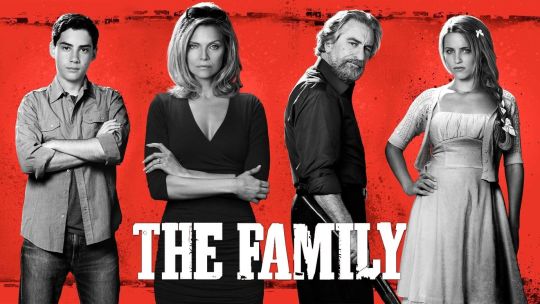
FILM | The Family (2013, dir. Luc Besson) Welcome to a mafia movie if it were rooted more on comedy than drama. And for the most part, it actually does work. But I won’t lie to you, it still just feels like another mob movie. It almost got me there, because it’s from a different perspective and a slightly different tale... before falling short during some crucial scenes.
Brace yourselves, this is a long one with lots of spoilers.
Giovanni Manzoni (Robert DeNiro) is a mafia boss that *gasp* snitched – but in his defense, there were attempted his on his and his family’s lives; it’s what any patriarch would do. For the obvious reasons, he and his family are put under Witness Protection and are relocated. And when we catch up with the Mazoni’s, we don’t have a clue how many times they’ve been relocated, but it’s obvious this isn’t their first rodeo. They are on first name terms with the Fed in charge of their seemingly constant relocations (Tommy Lee Jones as Robert Stansfield), as well as the two other agents set up in the safe house across the street from their new home.
This was a moderately fun movie; acceptable for DeNiro fans, good for a few good chuckles, and for those of us Italian-Americans, at least one moment where you could definitely relate. But I thought it felt underdeveloped in some spots. Or, overdeveloped in the wrong places. Regardless, it left me wanting more; eventually I just got bored and wanted it to be over, keeping my fingers crossed for something, anything, to give it a redemptive twist. Sadly, it’s just another mob film that revolves around that typical “taking people out who have wronged me” violence we always see in these tales.
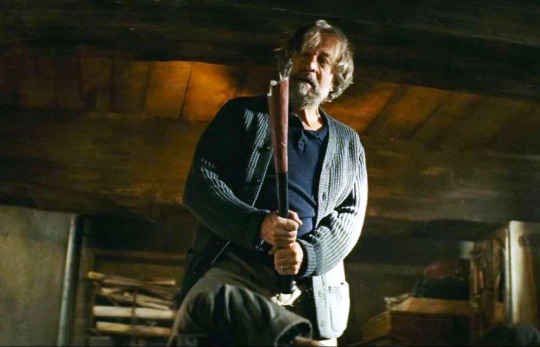
Robert DeNiro is a great actor, but Gio was a little boring to me. Gio writing his memoirs – revealing all that he’s experienced as a boss – was intriguing and an obvious opportunity to provide backstory, but It would have been MORE interesting if something had actually become of his manuscript. Furthermore, I found his “why is the water from my faucet brown?” arc bland. Was that really the best writers of this movie could do? Gio going around shaking people down for answers in typical mob guy fashion? I suppose he was to be laying low, mostly sequestered to this little old French house with not much to offer, and it was a way to give Gio a more personal touch, a sense of activism to help himself and ultimately the community, but I have to believe there was something better that could have given him to occupy his time. At least he ended up in a decent scene: a film debate/discussion amongst the locals where, in a turn of events, he found himself talking about topics related to Goodfellas (pssst, for those that don’t know, DeNiro also starred in Goodfellas). But mostly, I just think The Family is just an aging DeNiro starring in the same stuff he’s always done. It makes sense when you see Martin Scorcese’s name as a producer.
I had a little more interest in Maggie (Michelle Pfeiffer), but only a smidgen more and really because of her culinary related scenes. The first, when she brings a snack to the FBI agents in the safe house – roasted peppers doused in olive oil and garlic. I literally said out loud how delicious that sounds (yes, my Italian is showing). And while I don’t necessarily agree with what she says in denouncing the French use of butter and cream in the majority of their dishes, her description of the effects of olive oil versus butter in the body was a fantastic scene. Other than that, her only major arc was related to going to church and attempted redemption through religion, which is all too typical Italian-American fare in film. Again, like DeNiro, her character was just so typical of a mafioso’s wife.
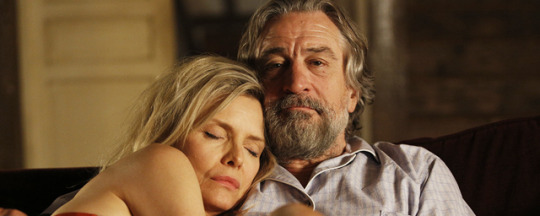
The way The Family differs from other mob films I’ve seen is that viewers get a bigger glimpse into the kid’s point of view. Which might be why I feel the arcs of Belle and Warren overpower that of their parents. They had so much more memorable aspects that I just didn’t have with Gio or Maggie.
With Belle (Dianna Agron), we have the “girl next door” with an attitude and edginess thanks to her place in this hardened family. Honestly, I think they did her dirty with her arc and character. Belle becomes infatuated with a college-aged substitute teacher that we ultimately see in an overly dramaticized look at teenage love. How could a girl that beat the crap out of a boy her own age earlier in the film (for good reason, more on this later), who was also savvy enough to seduce the aforementioned teacher in the first place, be the same girl that wanted to commit suicide because of unrequited feelings? I call lazy writing (**SPOILERS** it is on that rooftop where she contemplates death that she sees incoming trouble for her family). Even later, during the final fight scene, we see Belle quite literally prancing away and crying while trying to escape the bad guys, despite having just shot them up in a pretty badass way mere minutes before. MAKE UP YOUR MIND, PLEASE?!?! I found my feelings about her character bounce back and forth with each scene. Girls next door can still be feminine and hold their own in the face of danger. Psh.
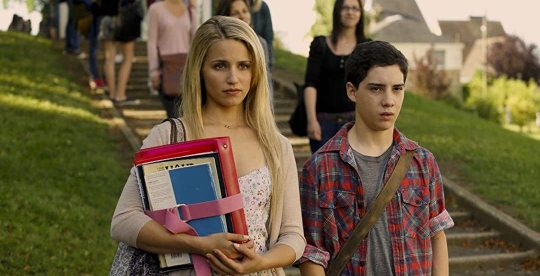
And while Warren (John D’Leo)’s narrative isn’t as dramatic as his sister’s, his role in the overall story was just silly to me. First of all, this kid is mastermind enough to collect information about his fellow classmates at his new school in record time, and create a resulting “mini mafia” system to not only take down the school bully but also make profit from his fellow students. Like, this boy has got skills for sure. But Warren is also sloppy. He has the abilities to create such an amazing thing for himself... yet apparently wasn’t capable of keeping all his goings-on underwraps and was confronted by school faculty. Again, I say lazy writing, as his role was the same as Belle’s in ushering the final conflict of the film (like legit, it his slip up that makes the whole ending happen). But at least I’ll say it is more realistic in the repercussions of his actions; we see schoolyard violence often enough in film, but not always the punishment for doing so.
This is very obviously not a perfect film in my eyes. Especially considering they neglect how the Witness Protection Program actually works – YOU DO NOT JUST CHANGE YOUR LAST NAME, GUYS. Only Gio changes his entire name to his new identity, “Frank Blake.” The rest of his family maintains their same first names. This and other details throughout the film honestly just bother me to no end.
Buuuut.... I love that we see each family member handle things on their own against those that wrong them throughout the film, while simultaneously doing their part to defend their family. Of course we expect acts of brutishness from Gio, that’s just what he does and how he rolls. Then, however, we see Maggie, at the grocery store asking for the overtly American specialty of peanut butter, and the townspeople begin badmouthing Americans because of it. So what does she do? Sets off a little explosion in the back of the store that starts the place on fire as she walks away. And Belle has the previously mentioned tussle with a group of male classmates, when one is being a gross greasy boy wanting to take advantage of her at a park when she merely just needed a ride home. Not only does she hit him with a vicious right hook, but she also finds a tennis racket in the trunk of the car and continues to pummel his disgusting ass while simultaneously giving a stern lecture on how to treat women and how important women are to the men’s futures (again, how does this badassery get so warped later on for her?) Similarly, young Warren’s run-in with the school bully allows us to see how masterful his skills are for utilizing his knack for collecting information and creating a well-crafted pull with the other students as a result (class nerds and rugby players alike) to give that bully exactly what he deserves. Not surprised at all that each and every one of the Manzoni’s/Blake’s would handle matters with violence, as all good mafia families do. And it’s equally not shocking at all when **SPOILERS** we see them drive off into the distance to start anew again at the end of the film. I was, however, constantly waiting for this wonderful moment at the end of the film where I believed the entire family was going to fight together, literally side by side. And it never happened. Honestly, the big gunfight between the Manzoni’s and the Don(s) he betrayed felt so anticlimactic I think because of this fact. We know they’re all capable of holding their own separately as they’ve already demonstrated, and they did it separately again here at the end, though at least in the same vicinity. But just think how beautiful it would have been to actually do it all as a true family unit, as was seemingly impressed upon us throughout the film.
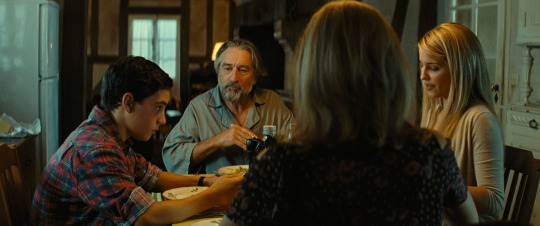
I know The Family is not supposed to be some award-winning dramatic piece of cinema. In fact, some if not most reviewers call it a satire of the mafia trope or dark comedy. But I think Ben Nicholson of CineVue (found via Rotten Tomatoes) says my general assessment quite well: it is “acting Goliath [DeNiro] as a now all-too-familiar caricature of the parts that made his name.”
Frankly (ha! see what I did there?), I would say it’s a film I might put on as background noise as I often do with the television when I stay up late these days, but only if I’m truly desperate; I would not actively pursue watching this one again.
OH! I do like fun facts though: like that this is the first time we see legends Tommy Lee Jones and Robert DeNiro together in a film. Only took forever, right? And apparently there’s another with these two coming out later this year, a remake of The Comeback Trail. Equally so, The Family was actually based on a book called Malavita by Tonino Benacquista. How much you wanna bet the book is better?
#film#films#movie#movies#cinema#the family#the family (2013)#robert deniro#michelle pfeiffer#dianna agron#john d'leo#mob#mafia#mafioso#tommy lee jones#dark comedy#satire#quarantine#quarantine entertainment#movie night
0 notes
Photo

BOOK | The Girl with the Lower Back Tattoo by Amy Schumer Looking back, it seems very strange that I asked for Amy Schumer’s debut memoir for Christmas back in 2016 (and it also seems to be a running theme for me, oyyy). But I suppose I had the same idea back then as I do now, when I decided to finally read it: dear book, change my mind about Amy Schumer. And surprisingly enough, it kinda did.

This book was good. Like, dare I say I would keep this book on my shelves (my rating system is basically keep it vs. sell/donate it, and this one is surprisingly a “keep it”). While Amy does at times go too far and/or make some offensive comments, they were few and far enough in between for me to still enjoy the book overall. They weren’t overpowering like some people can be. And with those offensive comments, she is definitely aware of what she says and often immediately rebuts the jokes to readers before they cause an uproar about them (I’m sure if I dug deep enough into the interwebs, people probably did call her out on it anyways, but still, she was aware). I wouldn’t say I was supporting the things she said, but knowing what I know about her comedic style (read: she literally makes her living on being vulgar), I let it be and kept reading.
That’s not to say that the things she did/does/will do didn’t bother me at all. As a writer and a reader, sometimes it can hard to be on both sides of the conversation. Like it’s hard for me to say that I was very much entertained by her book, knowing full well that she’s also done/said/been many things I don’t agree with. Which might be why it took me a good long while after reading her book to properly write about it (I finished it about two weeks ago). To be quite frank: I really liked her writing style, I loved how candid she was, I loved how empowering she seems to be, and also honestly how relatable she was throughout the book. But then I see things like this article shared by a Goodreads reviewer, who actually took down her review because she didn’t want to promote Schumer anymore and I get it that stance too. Because I don’t condone her supposedly doing or being those things either (joke stealer, racist, etc). So I’ve narrowed it down to this... Basically, I think I feel about Amy Schumer the way I feel about Lena Dunham (it makes sense, since they’re close friends) – I don’t outright hate her, but get a slight uneasy feeling, or some other feeling I can’t quite pinpoint exactly, whenever she’s mentioned or involved in something. I honestly took the dust cover off TGWTLBT so I didn’t have to constantly look at Amy’s face and get that feeling. Coincidentally, I think that also made me disassociate her from the book enough to enjoy it. It’s weird, I know, but I think that was a thing.
Despite all that mumbo jumbo, reading her memoir has actually given me – believe it or not – a greater appreciation for Amy Schumer. She may be crude and uncouth (wait, did I just quote Titanic?) but I discovered she is is so much more than her stage presence. She is Amy, an abuse survivor; she is Amy, the sexual assault survivor; she’s Amy, the advocate against gun violence; she is Amy, whose father was an alcoholic and has multiple sclerosis; she is Amy, her sister Kim’s best friend; she is Amy, of a broken family; she is Amy, the feminist. I’m not saying that a celebrity has to have lived through such hardships for me to consider them human like the rest of us, but my god, if they don’t help put things in perspective, help put you in her mindset. She is not perfect – like constantly referring to herself as “Long Island Trash” and always calling her facial features “pug-like,” both so sad to me when I read them – but she is fiercely dedicated to all that is most important to her. Including her craft as a comedian. And, not gonna lie, I learned far more about Amy’s sex life than I ever thought I needed to know too because she’s such an open book.
So to answer that question, of whether I would watch her show (or honestly any of her shows)? Maybe. I have a feeling I might just like her on paper, more than on screen. But I guess we’ll just have to find out, won’t we?
#book#books#read#reading#literature#amy schumer#the girl with the lower back tattoo#the girl with the lower back tattoo by amy schumer#comedian#commedienne#comic#stand up comedy#quarantine#quarantine reads#quarantine reading#review#reviews
0 notes
Text

I was recently reminded that June 6th was this woman’s birthday. Cleo Virginia Andrews, better known by her pen name: VC Andrews. Had she not died of breast cancer in 1986, she would have been 97 years old this year.
She passed away a couple years before I was born almost literally to the day (she died Dec 19th, I was born Dec 18th three years later) but yes, friends, I was (am? I haven't read them in ages) a VC Andrews fan and refuse to remove her books from my shelves. Except for a chunk of the more recent publications from her ghostwriter (and looking at the list of books under her name, it seems like I stopped purchasing them in 2013), I have collected all of the books she's written. I even distinctly remember giving a "persuasive speech" about her my second year of college, trying to convince my classmates to read her books.
I wish I could remember for sure which book was the first I picked up. I want to say and do believe it was My Sweet Audrina that I found at an antique show. But they will always have a special place on my shelves (and alright I'll be corny, my heart too) because they were the first "adult" books I got into. Despite the fact that it's essentially the same narrative formula repeated through each book in each series and how horrible that formula really is... I'll admit I almost still want to read them again. Maybe someday in the future, I'll return to her gothic world.
Happy belated birthday, VC. You're still my girl♥️
#book#books#read#reading#literature#gothic#gothic literature#vc andrews#virginia andrews#cleo virginia andrews#flowers in the attic#my sweet audrina
15 notes
·
View notes
Photo
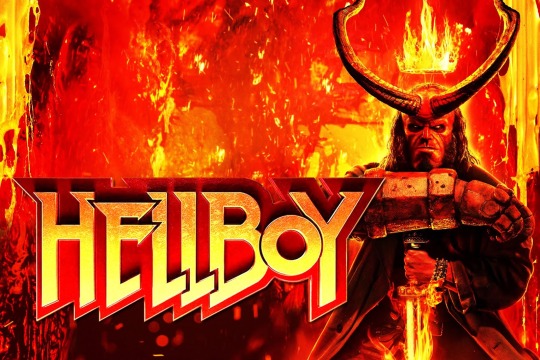
FILM | Hellboy (2019, dir. Neil Marshall)
I’ll start by saying that I’m a fan of the Guillermo del Toro/Ron Perlman interpretation of Hellboy. That’s where I discovered the story (the graphic novels are on my “to read” list) and that’s who I envision as the character. I gave this newer rendition the benefit of the doubt to see where it would go if they refused to give del Toro/Perlman the sequels they deserved and should have gotten. And, just like many other fans, I too was disappointed. Shocking, right? (*soooo so so much sarcasm*)
Through some research – because I could NOT bring myself to believe the this narrative was based on the actual graphic novels in the series – I learned that this Hellboy pulled a large amount of its source material from The Wild Hunt. Ya know, the one where we learn that **SPOILERS** Hellboy is a descendant of King Arthur. Yes, THAT King Arthur, the guy from the Round Table. If you just facepalmed yourself, know that I did too when I saw that on screen. I can appreciate the source material, and possibly could have gotten behind this story as a choice for the film had it been done well, but in this instance, King Arthur just felt so... corny.
With The Wild Hunt, it is also said to source Darkness Calls and The Storm and the Fury and I think this is part of where things went askew with this new Hellboy – it tried to have too many components from too many sources (and it should be noted: the 2004 Hellboy stemmed from Seed of Destruction alone). As I was watching, I felt many times that its was all too disconnected and didn’t have a good flow. It had too many people’s intros and narratives to explain in a little amount of time (I’d say a mere two hours is short in this instance)...
Even listing just the most important, there was still:
Hellboy
Hellboy + Broom
Hellboy + Alice
Nimue
King Arthur/Merlin vs. Nimue
King Arthur’s descendants + Hellboy
Hellboy vs. The Osiris Club (and giants)
Hellboy vs. Gruagach (the pig-fairy)
Major Ben Daimio’s whole mysterious spiel (which was actually predictable)
Baba Yaga
GOOD GRIEF, LOOK AT THEM ALL. Not to mention, much of these narratives were done in a flash/moved too quickly, and mostly got overrun by unnecessarily bloody fight scenes anyways.
Guess what, people who make movies? Giving something an R-rating, uncharacteristic profanity (according to many reviewers who have read the comics, the most Hellboy might say is “son of a bitch”) and adding copious amounts of blood/gore/creepiness does not mean it’s going to be successful. Coherency, story, and character development are equally as important. Don’t just fly by hoping people know the material enough to fill in the blanks you left out. Like I almost felt lucky to know what I know about Hellboy, to recognize that even the likes of his origin scene (where he is taken in by Broom) this time around was immensely understated – which I would say then also underplayed his relationship with Broom. Also, someone please tell me the whole point of having Thomas Hayden Church appear for less than two minutes during this scene as Lobster Johnson. For obvious reasons I doubt there will be a sequel to this movie (they also gave him a post-credits scene setting up that possibility), so it’s such a waste of screen time and took away from details that really mattered.
I do like the idea that Mike Mignola himself (the author of the Hellboy graphic novels) supposedly had a hand in this film, but more truthfully, I wonder how much freedom they actually gave him to create the world he envisioned. Because, like reviewers on IMDb I skimmed, I find it hard to believe that this is closer to Mignola’s own perception of Hellboy. You never know what really goes on behind the scenes, and I speculate that maybe the filmmakers had Mignola help for a metaphoric two seconds just so they could say he played a hand in it. Maybe a ploy to give 2019′s Hellboy more standing and solidity as a film. But what do I know about cinema politics. And maybe I’m wrong, since another critique claims it failed because it was too faithful to the comics... and who more likely to make it painfully faithful than its own creator.
I’m curious if, maybe, had I watched this one with fresh eyes (read: having not seen the previous films), would I have felt any different about it. And right now, I’m sitting here staring off into the distance trying to envision the movie as objectively as possible, pretending I had zero expectations... but it still just isn’t happening for me. While the new, edgier quality feels just as gritty and gruesome as the comic, in my mind there was too much against it. Like, for some reason, David Harbour’s prosthetics, especially around his mouth and ESPECIALLY when he was talking, bothered me. And, while I get that they were really trying to distance themselves from the early 2000s films by employing new sidekicks, it didn’t feel right without Liz Sherman and Abe Sapien (though Abe’s name does make a brief cameo at the end). I almost feel as though Milla Jovovich as Nimue/The Blood Queen was the only casting that really made sense here. Heck, even the music they chose to soundtrack this film fell flat.
I’m not saying I really wanted to like this Hellboy, but I definitely didn’t want to see the story of a character I enjoy done so poorly. I can give props to improved cinematography and effects in the fifteen years since Hellboy 2004, as was to be expected as technology continues to improve. But it’s mostly another reboot ruined by a bad script. So sad.
And to think, this all could have all been avoided had they just given Guillermo del Toro the opportunity to finish his envisioned trilogy in the director’s chair, instead of merely a producer for a third film. Maybe one day Hollywood will figure it out: films will cult followings have the power to ruin your box office numbers. Just give us what we want.
#hellboy#hellboy 2019#david harbour#ian mcshane#milla jovovich#film#films#movie#movies#cinema#quarantine#quarantine entertainment#review#reviews
0 notes
Photo

BOOK | Talking As Fast As I Can: From Gilmore Girls to Gilmore Girls (And Everything in Between) by Lauren Graham
I often include Gilmore Girls on my list of favorite shows. And for the most part, it’s still true. Nowadays, I just might give it a stern side eye thanks to various posts around the internet explaining why Rory is a horrible character (because, really, she IS pretty horrible) and that stuff unfortunately just can’t be unseen... But when I first watched it and the revival, that show was golden. So, of course, reading Lauren Graham’s memoir Talking As Fast As I Can was something I needed to do.
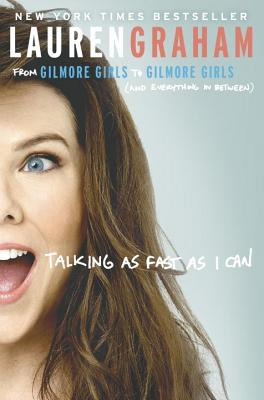
The last few books I’ve read have been infuriatingly disappointing, so I’m pleased to say that Talking As Fast As I Can was actually a decent read. Maybe it’s because Lauren is just so much more normal compared to many people in her line of work and her stories were more humble and relatable. She worked hard for her achievements – in her book, she regales us with many stories about her time in labor/services jobs, as well as her stints in the theatre before and during the start of her career – and has turned out pretty much unscathed (read: I haven’t heard of any Hollywood scandals involving Lauren Graham, have you?) The voice with which she writes TAFAIC is great (very reminiscent of Lorelai Gilmore, I might add), and full of humorous pop culture references (just the way I like it), but... it’s not without its faults.
While she does discuss her times on Gilmore Girls and Parenthood in detail, I wouldn’t say those stories revealed much about those shows from behind the scenes. Rather, she just shared what I felt were some very bland, blasé thoughts and feelings. There’s nothing wrong with what Lauren shared, but when she played them off like her perspective was going to be so much more than it was (even going so far to include a spoiler alert for the GG revival), I was expecting something much more. The chapter about her first experiences with the Gilmore’s was more like a “live blog” of her finally watching the whole series, since she is an actor that does not watch her own performances. And all she does is just make comments in regards to seasons as a whole – how the current world of (then, when the book was written) 2016 was different from the early 2000s when the show was filmed, notes about the fashion, and what she loves about each season. Hardly a tell-all.

Similarly, for the second Gilmore iteration (the thing that probably spurred this whole book in the first place), was instead “journal entries” she kept during filming. Which, in many cases, I felt it was more telling about how she tried desperately to get people she knows onto the show. The revival chapters did exhibit more about her emotions, because it was an emotional time for everyone involved, but the spoiler alert aspect she wrote of was not really necessary. Maybe some small details were revealed, but I guess it really didn’t matter because of I’ve already watched GG: A Year in the Life. Even if I hadn’t, like if in some strange world I actually read something the same year it was first published, I still don’t believe she gave away humongous bits of information. It’s not like she gave away the final four words of the series that everyone was freaking out about.
As fun as it was to read (meaning: I didn’t have to struggle with it at any point), there was no “a-HA!” moment where I felt shocked by a revelation or some big inspirational passage that I connected with. My only real surprise here was finding out that her partner of the last ten years, Peter Krause (her co-star from Parenthood), is from Minnesota.
If there’s one thing all readers of Talking As Fast As I Can can agree on, it’s that we all end up with a yearning to re-binge Gilmore Girls (or, in my case, also add Parenthood to our watch list). And I think that’s mostly all I’m left with here, too.
#book#books#literature#read#reading#talking as fast as i can#lauren graham#talking as fast as i can by lauren graham#gilmore girls#gilmore girls: a year in the life#lorelai gilmore#quarantine#quarantine reading#review#reviews
5 notes
·
View notes
Photo

FILM | Uncut Gems (2019, dir. Safdie Brothers)
I have been reading a lot of stuff online trying to better understand this movie. Because it took my boyfriend and I two sessions to watch this fully, and we weren’t pleased with it. The whole time, we kept saying – literally out loud – “Why is this movie #2 on Netflix right now?” My guess? Because it’s the first thing Adam Sandler has done in years (apparently his last theatrical film was Pixels in 2015; everything else went straight to Netflix), and it’s not his typical slapstick comedy; for that, I will give him credit, as it was interesting to see him in something different. I was still almost waiting for Drew Barrymore or Steve Buscemi or anyone from his cinematic posse to make a cameo here though. But nah, they never showed up. Instead, we randomly get a fight scene with The Weeknd? Is this movie for real? It’s a trip, that’s for damn sure.
I spent pretty much the whole movie guffawing about everything. It’s entire plot is based on Kevin Garnett not wanting to give a (albeit beautiful) rock back, and a man (Adam Sandler's Howard Ratner) with a gambling problem constantly owing other people money. Guys, if I wanted that type of film, I would just watch a movie about Las Vegas or some sort of mobster movie. Needless to say, I really really did not and do not understand the hype surrounding this film until someone kindly and thoroughly explains it to me.

So back to the vast scopes of the internet, I figure out from various sources that Uncut Gems is SUPPOSED to be stressful, and that’s the entire point. That’s apparently the genius behind it. While I’m all for movies that have some sort of “genius,” I guess this one just wasn’t my cup of tea. Part of it may be I’m not wild about sports and don’t understand sports gambling, which in itself plays a central role in the movie. Maybe it’s because I definitely don’t like the n-word thrown around as often as it was (even if it is often said by black men themselves, but let’s not get into that conversation). And possibly I might add that I don’t need a film that once again portrays Adam Sandler as a Jewish man and having pivotal scenes take place during Jewish traditions. I just don’t know, okay? But somewhere amongst all this, having stress play a crucial part in a film – most especially during a time of real-life stressful events – is just not something I wanted to experience. Had I known that detail going into it, I might have skipped it. (Though probably not, because my curiosity about its popularity would have driven me equally as nuts).
I was pleasantly surprised to see Idina Menzel in her role as Howard’s (Adam Sandler) estranged wife. Seeing her in something not related to Frozen is a refreshing change. And dare I say, there��s something about her that makes her the epitome of Jewish wives, like she was perfect for a role like this. Otherwise, except for the obvious bigger names included, the majority of the cast were people unknown to me. Which is to be expected from an indie movie such as this.
Oh, and I mildly feel obligated to say something about Julia Fox (who played Adam Sandler's co-worker and live-in girlfriend, also named Julia), because scattered throughout the articles critically acclaiming Uncut Gems, you will also find just as many spouting that Julia is the breakout star from the film. Her IMDb page merely tells me that she is an actress and writer, and very little else. So wandering around the Internet some more, I discover (here) that she and her character are in the film are very much one in the same, give or take some small details. She truly is that Italian-American New York "biotch" (her words) and apparently she is long-time friends with director Josh Safdie. Furthermore, it seems she stems from a socialite background/was a fixture of the NYC clubbing scene, and also dabbled in the arts (including paintings done in her own blood, as well as writing and directing a short called Fantasy Girls). Reading more about her, I've discovered that I'm honestly more interested in Julia Fox and what she's done artistically than the movie that brought her to me.
In most cases, I have this thing where I would like to watch films twice before talking about it (I’m making a post about this, coming soon) but I knew I wouldn’t be able to do that with Uncut Gems. Watching this once was more than enough. At least with trying to figure it out for days, I was able to keep my mind fresh about the subject enough to write about it. And the one thing I have to say about it is this: the final plot twists at the end definitely got me good... but I wouldn’t go out of my way to watch Uncut Gems again.
#movie#movies#film#films#uncut gems#safdie brothers#adam sandler#idina menzel#netflix#quarantine#quarantine movies#review#reviews
0 notes
Photo

BOOK | Wildflower by Drew Barrymore Sooo... reading Wildflower brought up an important question: Are there people out there that don’t like Drew Barrymore? I feel like you may be indifferent to her, but no one outright dislikes her. I mean, just look at that face. ☝️
Much like my previously discussed affinity for Mindy Kaling, I share those same feelings for Drew; I have always had a soft spot for her. Though this time, I have actually enjoyed and followed her career over the years. It would go without saying, her memoir seemed like it could be promising reading material. Anyone who knows her history knows that Drew has lived an interesting and fast life before reaching her twenties. To finally get an inside scoop into that life from the woman herself is what everyone wants to read.
I sped through Wildflower in one weekend.
Let me start my saying – Drew Barrymore loves exclamation points. Like a lot. Like, maybe a little too much. I could maybe write it off by saying that she’s excited and passionate about many things, which are admirable qualities for human beings... but still, my gosh, woman. She also really writes the way that she talks. Using a lot of conjunctions to begin sentences (”And” being her favorite), and just as much forming paragraphs out of fragmented sentences. I have no judgment because I also write this way (the fragments, I mean). Sometimes reading so much of it, though, is overwhelming. I’ve learned through the many non-fictional materials I’ve read lately that it helps to imagine the person’s voice as though they’re speaking to you; imagine Drew Barrymore speaking these words in her Valley Girl tone and it works. This could be an excellent opportunity to utilize the audiobook because then it could maybe help give the essays a better flow. I can’t say how many times I was rereading some passages to fully comprehend what they were trying to convey. It is one of those times that you find out that certain people just aren’t necessarily meant to be writers; in the preface of the book, Drew says she was essentially using this book to get some things off her chest, and that’s exactly what this felt like.
One thing I really wish would have happened in Wildflower was that her essays be chronological. Or at least more chronological than they were. Within the first few chapters, we bounce from her childhood at Poinsettia Place in West Hollywood where she lived for a time with her mother, to skydiving with Cameron Diaz after filming Charlie’s Angels. Back and forth, back and forth. I believe her book would have been all the more moving had she shared her stories in a way that better illustrated her rise in stardom as a kid, her fall from grace as a teen, and then the way she built herself back up after emancipating from her mother at fourteen. Granted that is a classic “fall then pick yourself back up” we’ve seen often from other celebrities in Hollywood (Robert Downey Jr, anyone?) and it’s probably boring at this point, but it honestly would have made much more sense and let us know what mindset Drew was in during that particular time in her life. I guess that’s Drew for you though, doing her own thing the way she wants to do it. Again, in the preface of the book, she actually explains that this wouldn’t be one of those run-of-the-mill of memoirs. And likewise, it definitely wasn’t going to be a tell-all. These were rather just the stories she wanted to tell. Which makes you wonder, of all experiences you’ve lived so far... which ones would you feel were most important in your life to share, immortalized in a book?

I think the stories Drew chose were instead to prove to the world that she’s no longer that rebellious kid living beyond her years. Honestly, what I learned from Wildflower, is that Drew Barrymore is no longer wild at all. She has become incredibly mellowed – I suppose that’s expected at 40 – and has essentially taken a lifelong devotional to her daughters. If she does anything related to Hollywood, it is more often behind the scenes of or through her production company Flower Films. And even then, Flower has expanded beyond cinema (i.e. they now do fragrance, beauty, and eye wear). You’re more likely to see her housewares line at Walmart than her face on screen.
While I’m not saying that every riotous person has to maintain that defiant lifestyle forever, I feel as though the version of Drew Barrymore I believed I connected to in the past is no longer there. Furthermore, everything she included in the book was too guarded to be in any way revealing, and for me, that was a let down. Once her stories were so much about her daughters and an almost obsessive quality of mothering (which I understand is her making up for the fact that she never received that kind of care as a child), my interest with Wildflowers waned. I guess I just don’t have that same maternal facet within me to find it interesting. So whenever people discuss it ad nauseum and basically admit their entire life is about their children now, how they’ve also changed who they are at their core because of these new tiny humans... I lose interest and utilize every ounce of my brain power to push through to finish the book. (But hey, that’s a whole ‘nother debate I’m not getting in to, except to say that, if she thinks the “born again” quality of becoming a mother is inspirational, she loses a much of her audience).
Really, I don’t think this book knew what it wanted to be. With every story Drew shared, she also liked to end some of them with a preachy little quip about how this was the lesson she learned from it and/or tried to pass it off like she was giving advice – especially later on when she would conclude with “and this is what I’ll teach my daughters.” Yes, most narratives that people like to share in books such as these are because the events were, in fact, learning experiences for the writer... but those books were written that way on purpose. More often than not in Wildflower, it felt to me as though it was trying to force stories to be something they’re not. Sometimes stories are allowed to just be stories; not every experience has to become the lesson of a self-help book. Wildflower at most felt like a love letter to her daughters, various family members (which is sad considering she divorced her husband a year after the book was published) and a handful of her closest friends. There was hardly any comments about Jimmy Fallon other than he being married to her best friend, Nan, and Adam Sandler’s chapter was less than satisfying – two relationships in her more recent life you would expect to be more than just footnotes in her dissertation.
None of this, however, detracts from that fact that, deep down, Drew Barrymore is honestly a good person and you can’t completely fault her for this book. There’s a reason she’s been a Hollywood darling for much of her life. She may have had rough childhood and upbringing, found most the way in life on her own, and naturally made some questionable choices, but even her rebellious, selfish years never changed that she is a deeply caring, impassioned individual. When she discusses the film projects she undertook, especially with Flower, you can tell that they were not just money-makers to her; the things she wants to and does do professionally truly mean something to her. If further proof is needed, there is a school in Kenya bearing her name, not merely as a means to showboat or for good photo ops, but because she genuinely has a heart of gold and wants to contribute to the world.
Through some research, I learned that Drew published another book back in the early 90s (when she was barely into her teens) that gave more insight into her childhood. While Wildflower did briefly tap into those years, it definitely wasn’t any sort of dirt shared on the topic. Many reviews across the board have deemed Little Girl Lost as a better, more honest and insightful book than Wildflower, and one day I would like to someday confirm that theory. But I regret to inform myself that Wildflower is just another in the disappointment category and that it seems we as readers won’t ever really hear the more insightful truths about the life of one Drew Barrymore.
#book#books#read#reading#literature#novel#quarantine#quarantine reading#drew barrymore#wildflower#wildflower by drew barrymore#review#reviews
0 notes
Photo
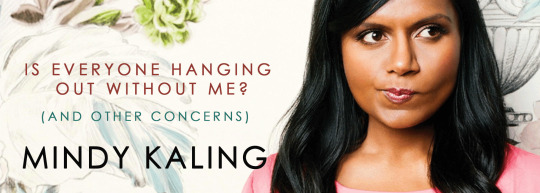
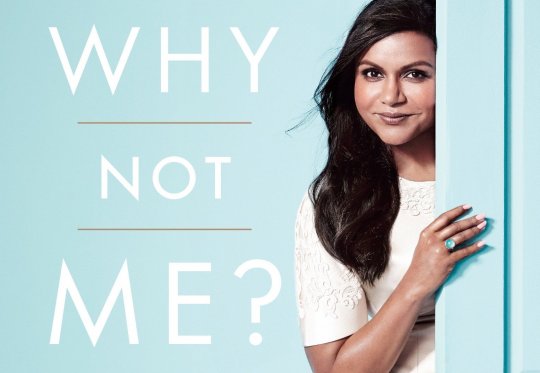
BOOKS | Is Everyone Hanging Out Without Me? (And Other Concerns)
[[&]] Why Not Me? by Mindy Kaling
For reasons unbeknownst to me, I’ve always liked Mindy Kaling. I didn’t watch the American version of The Office (I know, what is WRONG with me?!)... I would sometimes watch The Mindy Project reruns in the middle of the night many years ago... but not once would I say that I actually followed her career enough to take interest in her memoirs. But alas, I liked Mindy and I found myself with her memoirs on my bookshelves. Thanks to this ever so lovely situation the world has found itself in, I’ve finally made it around to reading them (along with many others that have been lingering in my TBR pile).
At first, I was going to write about Mindy’s books separately as I would a normal review on here, but after finishing them both, I think writing about them together is really for the best. They are such extensions of each other, of which I would probably make the same commentary about them both anyway. So their discussions here are joint.
When I started Is Everyone Hanging Out Without Me?, my hopes were high. I even jotted down a note that, forty pages in, so much of what she has discussed has been similar or has outright matched some of my same experiences and I loved it. And really, that statement did hold true for both IEHOWM? (it’s such a long title, you guys!) and Why Not Me? – I finally found a celebrity that I can say I really relate to, who shared the same struggles and exploits as me in our young adult lives. Furthermore, I also wrote a note saying that Mindy has a unique humor in both her acting and this (her first) book that I enjoyed. Plus, you’d be lying if you said you didn’t love the adorable photos of baby Mindy scattered throughout EIHOWM.

But I think, sadly, everything was short-lived.
I completely understand that Mindy’s career is rooted in comedy and that’s how she built a name for herself. In her early years, she and a friend created and starred in their own Off-Broadway production (about Ben Affleck and Matt Damon, no less) that gained quite the audience during its run. She then became a writer for The Office, then a star of the The Office, and well... so on and so forth, the rest is history. But I read non-fiction novels to learn more about people and his/her inner thoughts amidst stories of their life. That did happen with Mindy, but those peeks into her childhood, teens, and twenties were scattered throughout some pretty unnecessary chapters and what I perceive to be Mindy trying too hard to be funny. If I wanted fictitious ramblings, I would have just read a fiction novel. Not once did I feel that, for example, an entire chapter about fictional revenge stories that she concocts during her workouts had a place in her first book. Nor did I feel a good chunk of the second novel required fabricated emails (that were waaayyyy too thought out) between her and her imaginary coworkers she created had she lived another life and hypothetically become a Latin teacher at a private school. And – though it is known that I love a good list – she also included list upon list about the most random of topics (i.e. in IEHOWM? she included two pages worth of different iterations and levels of “chubby” people. Yeah Mindy is bigger than the average actress, but come on). In my mind, these books would have been a lot shorter had all the bullshit been removed. During Why Not Me? I literally wrote down the fact that, at some point during both of these books, I made it a point to read more quickly/more often, just to get them over with.
What became even more disappointing to me as I continued to read through these books was that... much of Mindy’s view of “comedy” was actually in poor taste. Granted these books were published in 2011 and 2015 respectively, and maybe had I read them back then I would have flew right past some of her commentary without a second glance. But in the here and now, in 2020, a lot of her comedic jabs left a bad taste in my mouth. In IEHOWM?, during a discussion about the people in New York City, while I find it perfectly fine that she says most people “function daily while in a low grade depression” because that’s at least mildly true, thirty-something pages later she makes a comment about how people with depression are “boring” and “tedious to deal with.” Maybe I didn’t enjoy this because I myself deal with some level of depression and always have a fear that I’m bothering people... but regardless, I still would not find those statements in the least bit comical. To further illustrate, when Mindy was on a “Curvy Celebs We Adore!” list and was smaller than the others included, she called the other female celebrities “porkers” and in more or less terms said how dare she be lumped in with these women on a list. And lastly, in a chapter about her characteristic requests for a boyfriend, she says she thinks she should date an older man, because they are more secure and have the immaturity out of their systems. She then, however, continues by saying that she doesn’t care if that man has kids, as long as those kids are away at college and (direct quote) “his wife is dead.” I believe my literal thoughts here were “WTF?!?!?!?!?!?” and I just really... lost interest, but continued reading just to finish the book (thankfully this was towards the end). Don’t even get me started on that Dartmouth’s 2018 commencement speech she gave, included in Why Not Me?

Despite everything I just said... I still enjoy Mindy, I do. I just can’t bring myself to fully disregard her. Even though she is roughly a size 8 to 10, she is still a better visual representation of the average woman in her roles that viewers find more relatable (though she made another ridiculous comment in Why Not Me? about how she does try to conform to societal norms of beauty but she just isn’t successful at it). Likewise, the character of Mindy Lahiri also does so much to showcase a professionally successful woman (and even more, a woman of color) at the helm of The Mindy Project. All of this is similarly what Mindy herself does as a whole in the industry – she is praised comedienne in (let’s face it) what has always been a male dominated field. It is because of her depictions and stature, as well as the undeniable similarities in our life narratives, that I can’t help but maintain a fondness for Mindy Kaling. Now it’s just... slightly subdued.
I have pages of quotes that prove that she does scatter her novels with solid advice and insight. But on paper, I mostly find that Mindy tries too hard and blabbers too much for my palate. There’s being funny, and then there’s taking it too far. Maybe because I read them back to back, it was just all beyond me. I just had a hard time getting past some of it. So they’re just another set of books that finally made their way out of the TBR pile and into ��try and sell online for spare cash” pile. It is what it is.
#book#books#read#reading#literature#novel#quarantine#quarantine reading#mindy kaling#is everyone hanging out without me?#the office#the mindy project#kelly kapoor#mindy lahiri#review#reviews
2 notes
·
View notes